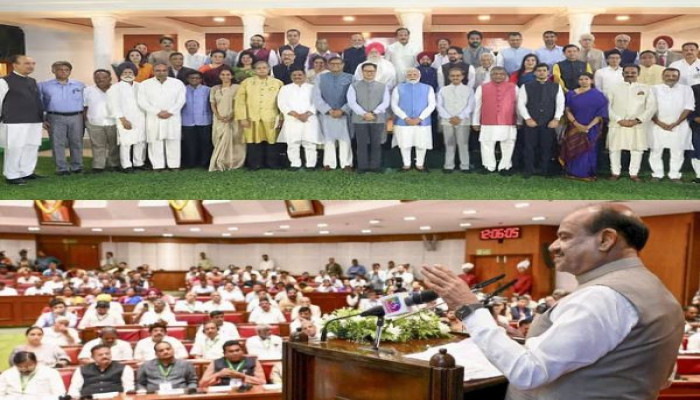Government considers multi-party parliamentary groups after global outreach on Pakistan terrorism
- In Reports
- 07:11 PM, Jun 23, 2025
- Myind Staff
The government started considering the formation of multi-party Parliamentary Friendship Groups that would interact with similar groups in other countries. This came after the success of delegations sent for global outreach following the Pahalgam terror attack and Operation Sindoor against Pakistan.
Lok Sabha Speaker Om Birla said on Monday that discussions about this would be held with all parties in the upcoming Parliament session.
Birla said several countries already had such multi-party parliamentary groups and had been asking India to form them. He said these groups would regularly engage with their foreign counterparts and would present best practices from the House. He added that they would help maintain communication between India’s Parliament and other legislatures.
Prime Minister Narendra Modi held a meeting that lasted nearly two hours on June 10 with the MP delegations after they returned from the Operation Sindoor tours. He expressed happiness over the success of the mission and suggested that it could be institutionalised.
Seven delegations took part in the tours. They included members from all political parties and presented the government’s stance on Pakistan-sponsored terrorism, setting aside ideological differences. The heads of these delegations included Congress MP Shashi Tharoor, JD(U)’s Sanjay Kumar Jha, BJP’s Baijayant Panda and Ravi Shankar Prasad, NCP(SP)’s Supriya Sule, Shiv Sena’s Shrikant Shinde and DMK’s Kanimozhi.
Birla visited Mumbai to attend a two-day National Conference of Estimates Committees of Parliament and State and Union Territory Legislative Bodies. This event was being held after 23 years. The Monday session took place at the Maharashtra Assembly and was attended by Chief Minister Devendra Fadnavis, Deputy Chief Minister Eknath Shinde, Speaker Rahul Narwekar and Estimates Committee Chairman Sanjay Jaiswal, among others.
The Estimates Committees of Parliament and state Assemblies examined government Budget estimates and prepared reports. The government used their recommendations to prepare the Budget. These Committees looked at proposed spending before the Budget was passed. This was different from Public Accounts Committees, which audited spending after it occurred.
While addressing the gathering, Birla said the conference aimed to bring more transparency to government budgeting and spending.
He said parliamentary committees worked like mini Parliaments. He explained that the Estimates Committees monitored financial planning, ensured correct use of funds and evaluated whether the funds served public interest. He said the conference would help share best practices from the Estimates Committees of Parliament and various Assemblies.
Birla said the conference would also focus on the use of technology and Artificial Intelligence. He said training would be organised for members. He added that the more AI and data analytics were used, the more transparent the process would become.
Speaking to reporters on the sidelines of the event, Birla said the government accepted nearly 90 percent of the Parliament Estimates Committee’s recommendations. But in some states like Himachal Pradesh, only 15 percent of recommendations were accepted. He said the two-day conference would focus on finding ways to bridge such gaps.
Birla said committees should not focus only on criticism. He said they should aim to bring transparency and accountability through discussion and evidence. He also called for better coordination between the Estimates Committee and the Public Accounts Committee.
In his address, Fadnavis said the committees worked throughout the year and kept the government accountable to the House.
He said the Estimates Committee was more dynamic because it reviewed proposed spending in advance. He said the Committee checked whether the Budget estimate was accurate and whether the spending was necessary. He said this ensured accountability. He added that in Maharashtra, about 65 to 70 percent of recommendations were implemented.







Comments